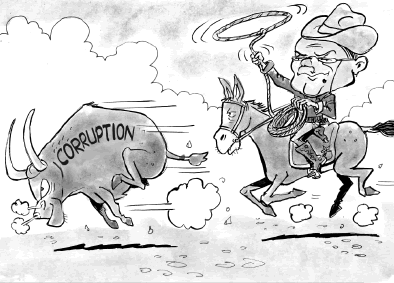
| EDITORIAL | Sunday, 25 May 2008 The culture of secrecy must end
The alacrity with which Transport Minister Austin Gatt opened an investigation, following allegations of bribery related to the acquiring of an instructor’s driving license from the Transport Authority (ADT), displays an eagerness and promptness to face allegations of corruption in public service. This should serve as a test case on how to deal with similar claims.
Allegations of corruption will always be with us, as will the tendency of persons to cast aspersions, often without the willingness to step forward and put all known facts on the table. That citizens in our small country are unwilling to step forward and publicly make allegations is perfectly understandable, if nothing else because the powers that be are traditionally more concerned with who spilt the beans rather than addressing the illegal act itself. Besides, the absence of a Whistleblowers’ Act leaves such persons vulnerable to discrimination and persecution at their place of work. But this tendency has also led to a widespread belief that no one in our country is ever held accountable, yet alone made to pay, for his or her incorrect behaviour. It is against this backdrop that the prompt action of a minister who has long carried a no-nonsense tag about him, is to be commended. At the same time, European levels of correct behaviour are not to be expected only of the political class, but also of all persons holding public office and whose wages are paid out of public funds. These standards are best guaranteed, not just by a probing press, but also by having all the tools and legal mechanisms in place to detect irregularities and to take instant action. Ministerial promptness is just one of the many tools at the disposal of government; many others of which need to be strengthened if effect is to be given to the fight against corruption. Firstly, the Permanent Commission Against Corruption needs to be beefed up with more human and financial resources, allowing it to function with full executive powers at an arm’s length from the government of the day. The authorities may also consider the example of Italian magistrates, who are entrusted with ample powers to institute investigations on their own, without having to wait for the go ahead from the Attorney General or the police. While recognising that magistrates in Italy have often come under attack for abusing such wide powers – sometimes almost to the extent of politicising the judicial class – in many cases these powers have also served as a deterrent to expose wrongdoing. Elsewhere, it is baffling to discover that government would have rightly taken legal action against a wrongdoing only because of a leak, without this information ever reaching the notice of the people through official channels. The present government has long promised a Freedom of Information Act, and it is precisely for these reasons that the initiative should be a top priority. After all, failure to make public cases of wrongdoing, often motivated by an irrational fear of tarnishing government’s own reputation, is invariably counterproductive: such secrecy creates the impression of corruption, even when there is none involved. Equally unwise is the tendency to allow investigations to be prolonged ad infinitum, in the hope that in time, people will simply forget or lose interest in the case. This tendency to prolong calls yet again into discussion the delay in making public the police investigations surrounding the Mistra case. If investigations have terminated the file should be passed over to the Attorney General, who is the legal arbiter to decide whether there are sufficient grounds to proceed legally or not. Whatever the legal implications there can be little doubt that there is a political responsibility, which the backbencher should assume whatever the outcome. The same also applies to magisterial enquiries. Although the government has no power to interfere in such matters, it remains a fact that many enquiries – including matters of urgency, as in the case of Bastjan Borg and Nicholas Azzopardi, which impinge on public trust of institutions such as the Police Force – are best concluded in the shortest possible time. This is in fact a standard feature of the terms of reference in such cases; but often, enquiries are allowed to drag on for years, resulting in the widespread impression that matters of serious consequence are allowed to pile up and gather dust interminably. It is in the interests of all concerned that the “cult of secrecy”, even if a misconception, is ended once and for all. Any comments? |
Copyright © MediaToday Co. Ltd, Vjal ir-Rihan, San Gwann SGN 9016, Malta, Europe
Managing editor Saviour Balzan | Tel. ++356 21382741 | Fax: ++356 21385075 | Email
Managing editor Saviour Balzan | Tel. ++356 21382741 | Fax: ++356 21385075 | Email
